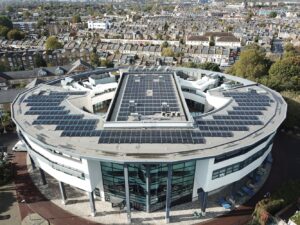As global temperatures continue to rise, business owners are searching for ways to reduce their environmental footprint and build a more sustainable future. Renewable energy is one of the most efficient solutions to help businesses move towards sustainability and reduce their carbon emissions. By investing in renewable energy sources like solar power, business owners can not only help protect our planet but also save money on energy costs over time.
This guide will provide business owners with a comprehensive overview of renewable energy and how it can help their bottom line. We’ll cover topics such as the types of renewable energy sources available, the environmental benefits of going green, and what investments may be required when transitioning away from fossil fuels.
Types of renewable energy sources
When it comes to renewable energy sources, there are many options available for businesses to choose from. Solar power is the most popular choice among business owners due to its cost-effectiveness and wide availability; however, other options such as wind power, geothermal power, and biomass are also available. Each type of source has its own unique benefits that should be considered before making the decision on which option best fits your business needs. Read more about the advantages and disadvantages of solar here.
The environmental benefits
Harnessing renewable energy is an essential step toward fighting climate change by reducing emissions of harmful greenhouse gases like carbon dioxide (CO2) into the atmosphere. Additionally, using clean sources such as solar reduces air pollution caused by burning fossil fuels like coal, oil, or natural gas – all major contributors to respiratory illness and other health issues. Ultimately, switching to renewable energy can have a positive impact not only on our environment but also on human health in the long run.
Investments required when transitioning away from fossils fuels
Making the switch away from fossil fuels requires a certain amount of financial investment upfront; however, these expenses can often be offset by government incentives or tax breaks depending on where your company is located geographically speaking.
Did you know? In the UK, you can claim capital allowances when you buy energy efficient, or low or zero-carbon technology for your business. This reduces the amount of tax you pay. (Gov.uk, 2023)
The investments needed for solar PV installation will vary depending on the size of your organisation. In addition, business owners should research any zoning regulations in place beforehand since different locales may require different permits or approvals before construction begins. Nonetheless, the installation of solar PV is subject to building regulations even if zoning regulations do not apply. Before installing, you must ensure that your roof can support the weight of the panels.
Interested in renewable energy?
Renewable energy is an essential component of building a more sustainable future for our planet—and it doesn’t mean sacrificing profits either! Thanks to UK government incentives and cost-saving opportunities provided by switching away from traditional fossil fuels. Businesses can benefit both environmentally and financially while doing their part in helping fight climate change. We hope this guide has been helpful in demystifying some complexities surrounding investing in renewable energy so that together we can create a greener tomorrow!
Want to start saving money and improve your brand’s reputation? Get in touch.
Start Your Journey to Renewbles Today
Our mission is to lower your carbon footprint through a pain-free experience.
Get a quote





